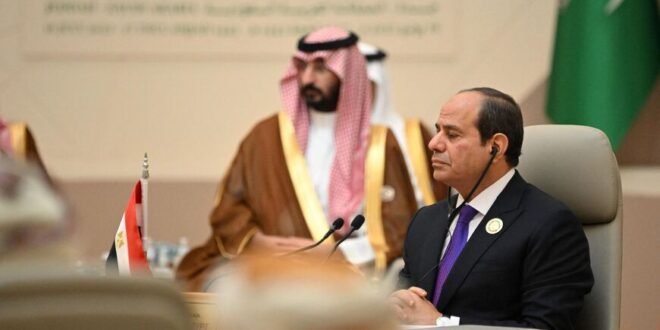Although the leaders of Arab and Gulf countries, as well as the United States, expressed support for a diplomatic solution to the Grand Ethiopian Renaissance Dam, many don’t believe this statement will revive the negotiations or push Ethiopia to end its unilateral measures.
The summit in Jeddah on July 16 between the leaders of the Arab Gulf states, Egypt, Jordan, Iraq and the United States touched on several major issues in the region, including the Grand Ethiopian Renaissance Dam (GERD).
The summit ended with a joint call for a diplomatic solution, while stressing the support for Egypt’s water security.
During US-Arab talks before US President Joe Biden’s visit to the Middle East, Cairo worked to mobilize pressure on Ethiopia to accept a binding agreement regulating the GERD.
During his meeting with Biden in Jeddah on July 16, Egyptian President Abdel Fattah al-Sisi stressed the need “to reach a binding legal agreement for the process of filling and operating the dam, in a way that preserves Egyptian water security and achieves common interests.”
Arab countries had offered several mediation initiatives in the past between Egypt and Sudan on the one hand, and Ethiopia on the other, most recently an Emirati initiative behind closed doors. Egypt did not reveal any information about the talks, while Sudan said talks had been held without mentioning any further details. None of these efforts, however, ended with a positive outcome.
Samar al-Bagoury, head of the Nile Basin Studies Center at the Cairo University, told Al-Monitor, “In general, it is not possible to rely on the Jeddah statement,” because “previous interventions by the Arab League did not yield any results.”
She added, “The US position is also not clear, as their statements remain diplomatic without giving priority to one party over the other, or clarifying the possibility of intervention.”
On July 24, US Special Envoy for the Horn of Africa Mike Hammer began a visit to the region, with stops in Egypt, the UAE and Ethiopia. In a statement July 23, the US Embassy in Cairo said that Hammer will “provide US support toward forging a diplomatic resolution to issues related to the Grand Ethiopian Renaissance Dam (GERD) that would achieve the interests of all parties.”
Observers believe that the US-Arab statement will not yield any quick solutions to the crisis. There are concerns that the dispute over the GERD could drag for years given the strict Ethiopian policies regarding its sovereign rights in the dam project.
Mohamed Nasr al-Din Allam, a former Egyptian minister of water resources and irrigation, told Al-Monitor, “The [recent] statement was weak when it came to the GERD, as it did not stipulate the importance of preserving Egypt’s share of the Nile water.”
The recent statement coincides with the start of filling the dam reservoir for the third year, during the flood season that started at the beginning of July. Based on satellite images, Egyptian experts expect Ethiopia to store 2 billion cubic meters of water at a level of 585 meters. Addis Ababa has not yet officially announced the volume of the third filling.
“The GERD crisis cannot be limited to the timing of filling during flood periods, because the dam poses a threat to Egyptian water security in general,” Allam said.
Meanwhile, Mona Omar, former assistant foreign minister for African affairs, told Al-Monitor, “It is diplomatically necessary for Egypt to have international support for its water interests in the Nile waters. But these positions must turn into economic and political pressure to break the Ethiopian intransigence by threatening to impose sanctions or an economic embargo, in a bid to get [Addis Ababa] back to the negotiating table.”
She added that the recent joint statement does not offer radical solutions, neither does it represent real pressure on Ethiopia. “These stances remain positive but ineffective in terms of resolving the dispute,” she added.
During his European tour from July 18-22, Sisi addressed the GERD issue. When the University of Belgrade awarded him an honorary doctorate on July 27, Sisi said, “Egypt took the option of negotiations when it came to the Nile waters. The Egyptian position is governed by principles and unity of our goal and destiny among the Nile Basin countries on the basis of mutual benefit and no harm.”
Egypt continues to officially stick to the diplomatic path, trying to maintain momentum by highlighting the dispute over the GERD in international and regional platforms.
Addis Ababa has been pushing to complete concrete construction in the dam body and fill the reservoir, thus imposing a fait accompli — a procedure that remains the main obstacle to finding any compromise solution.
 Eurasia Press & News
Eurasia Press & News




